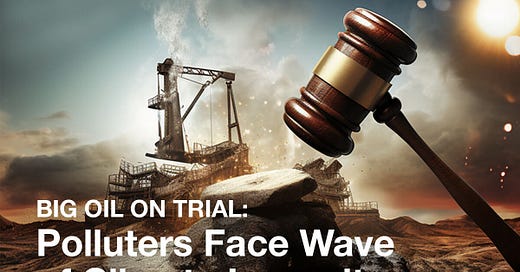Big Oil on Trial: Polluters Face Wave of Climate Lawsuits
With critical ecosystems continuing to decay, the fight for a livable future has moved to the courts. Has Big Oil finally met its match?
With world leaders descending on New York this week for the United Nations General Assembly and a special summit focused entirely on the worsening climate crisis, we’re yet again reminded about the dire warnings—some bordering on apocalyptic—about the future of our planet.
Just this week, U.N. Secretary-General António Guterres told assembled nations that “humanity has opened the gates of hell” in reference to climate change. That message was delivered six months after he characterized the crisis as a “time bomb” in his comments about the Intergovernmental Panel on Climate Change’s Sixth Assessment Report. The summary of that report said in no uncertain terms that human activity, particularly greenhouse gas emissions, caused global warming.
With the climate clock mercilessly ticking down, it’s ironic that communities are turning to the complex web of court systems throughout the United States as a tool against major fossil fuel companies. As the saying goes: “The wheels of justice turn slowly”—suggesting time is yet again not on our side.
Yet here we are—and those taking this battle to the courts are hoping this will be a defining moment for America’s justice system, an institution itself suffering from a pervasive lack of trust among the general public.
Yet Guterres did say back in March that “Our world needs climate action on all fronts—everything, everywhere, all at once.” Consider this latest push part of that effort. As such, states and smaller municipalities across the country are increasingly filing civil lawsuits against fossil fuel companies and their collaborators, notably the American Petroleum Institute, blaming them for the climate crisis and subsequent damages, fraudulent behavior, and deceiving the public.
This follows multiple congressional hearings in which executives from these companies were called to answer for their behavior and deceptive campaigns to obscure their roles in the climate crisis.
Why We Covered This Topic
One of the more frustrating elements of climate coverage is how the oil giants most responsible for ecological disasters are being presented as good-faith partners in bringing an end to this crisis. And it’s not just media coverage, either. These companies, along with their ad and public relations partners, flood the airwaves and influential platforms such as Beltway newsletters with clever messaging about their embrace of alternative energy solutions. In reality, those measures, forget how impractical, are largely outweighed by their continued commitment to fossil fuels.
Last year, the House Oversight Committee resumed its investigation of Big Oil disinformation and issued a memorandum stating: “Contrary to what their pledges imply, fossil fuel companies have not organized their businesses around becoming low-emissions, renewable energy companies. They are devoted to a long-term fossil fuel future.”
As these cases make their way through the courts, the discovery phase may lead to further revelations of what fossil fuel companies knew about the harmful emissions and when they knew it.
Once the U.S. Supreme Court this spring rejected a bid to move these cases out of state courts (and potential trials before juries), we knew we had to cover this story. It’s difficult to understate the magnitude of these cases. To put it in perspective, some experts are comparing these climate accountability suits to the Big Tobacco litigation of the 1990s.
What You’ll Learn in This Episode
States across the country have filed a slew of lawsuits against fossil fuel companies for their environmentally decimating actions. A tracker maintained by the nonprofit Center for Climate Integrity lists more than two dozen such cases centered around climate fraud, climate damages, racketeering, and environmental enforcement.
The U.S. Supreme Court this past spring rejected a petition by some of these companies to move these cases out of state courts on jurisdictional grounds. By declining to intervene, this not only allowed current cases to proceed in state courts, but opened the door for other states or municipalities to file similar suits. As a result, we may be on the precipice of a historic wave of civil jury trials with fossil fuel companies as defendants.
There’s growing evidence that fossil fuel companies knew about the disastrous impacts of greenhouse gas emissions on the planet and hid that information from the public. In April, a new set of internal documents from Shell revealed that the company accurately predicted the harmful impacts of its products on the climate going back to at least the 1970s. A Shell-funded report even used the phrase “greenhouse effect” to explain the consequences of increased carbon dioxide in the atmosphere.
Who We Interviewed & What They Said
Emily Sanders is the editorial lead at the nonprofit Center for Climate Integrity (CCI), which works with communities and lawmakers to help hold oil and gas companies accountable for their roles in the climate crisis. Sanders is also the founder of CCI’s ExxonKnews Substack newsletter.
“The oil companies are terrified of these cases because there's so much strong evidence against them. In the companies’ own words, the lawsuits pose ‘massive monetary liability’ for them. So they have been trying desperately for years to escape state courts, where they would have to face trials in front of juries that would see that evidence, and into federal courts, where they think it will be easier to escape accountability.”
Alyssa Johl is the vice president of legal and general counsel for the Center for Climate Integrity.
“There is well-established evidence, going back to the late 1950s [and] 1960s that really paints the picture of what the industry knew and when they knew it. And really, this is all revealed in their own internal industry documents, which is going to be quite damaging. We have a lot of evidence that points to what Exxon knew, what the American Petroleum Institute knew. Most recently, we came across a set of documents of what Shell knew—much further back than what we had originally had an understanding of. All of these companies were working in concert together, either, you know, individually, or as part of their membership in trade associations. So there was very clear linkage and understanding of what they all knew and when.”
Additional Resources
ExxonKnews has done some of the best journalism on the fossil fuel industry’s role in the climate disaster. Instead of directing you to one article, we suggest you subscribe and read it all.
There are so many climate accountability lawsuits that it can be difficult to keep track. Thanks to the Center for Climate Integrity, you don’t have to do so on your own. Here’s a helpful chart breaking down individual cases, categorized by the type of litigation.
As we mentioned in the intro of this important episode, here’s a link to the podcast ‘Drilled,’ which aired a report about how Shell funded climate denial.
Our Recent Climate Coverage
Listen to News Beat on your favorite podcast app. The button below will enable you to subscribe wherever you listen to pods. Please also share our Substack to help build this community and support independent media and indie hip-hop.
News Beat is a multi-award-winning social justice podcast that melds journalism with music from independent artists to highlight important stories and issues.
Audio Editor/Sound Designer/Producer/Host: Manny Faces
Editor-In-Chief/Producer: Christopher Twarowski
Managing Editor/Producer: Rashed Mian
Episode Art: Jon Chim








